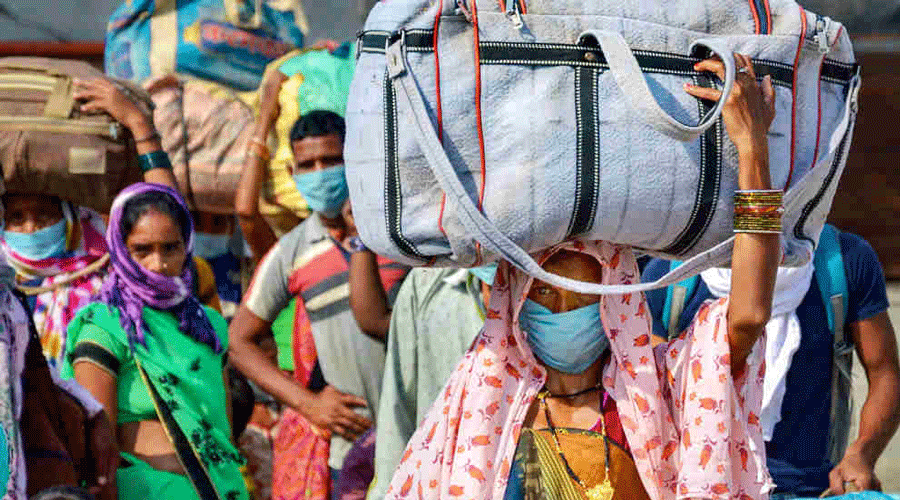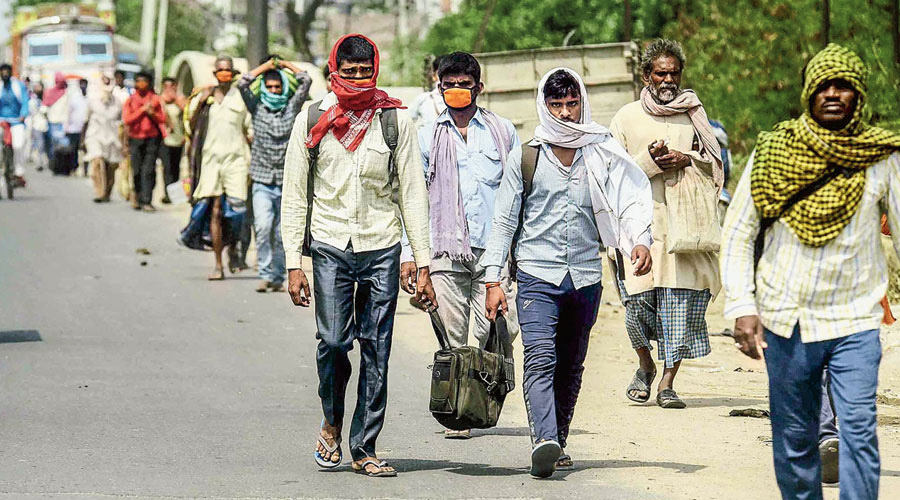The government has cited the Covid second wave to freeze fieldwork for five national surveys, including one on the socio-economic conditions of the epidemic-ravaged migrant workers.
Workers’ representatives, however, have said this should not become an excuse to delay assistance, underlining that a lot of data already exists on the vulnerable sections among the working class that make it clear they need immediate relief.
A labour ministry wing, the labour bureau, was to start these surveys from April.
“The house-to-house survey work has been paused for now because people would not entertain the enumerators. The survey work will immediately begin as and when the situation improves,” said D.P.S. Negi, senior labour and employment adviser in the labour and employment ministry and director-general of the labour bureau.
Two of the surveys were meant to assess the socio-economic conditions of migrant workers and domestic workers, respectively.
The remaining three were to study the employment generated by (a) professionals such as doctors, chartered accountants and lawyers (in the form of attendants, secretaries and the like); (b) the transport sector; and (c) all registered and registered establishments (the All-India Quarterly Establishment-based Employment Survey or AQEES).
The AQEES and the migrant survey were to start from April 1 and the other three in a phased manner from the third week of April. The surveys were to be completed by October.
A.R. Sindhu, general secretary of CPM labour arm Citu, said the findings of about a dozen surveys that were in the public domain had already highlighted the sufferings of migrant labourers, domestic workers and other unorganised-sector workers.
“Even if the official surveys had to be put on hold, a lot of surveys have already been done by universities and civil society groups. They all suggest that the unorganised-sector workers and migrant labourers have been hit the worst by the epidemic,” Sindhu said.
“The Centre and state governments need to provide food, vaccination and monetary assistance to the vulnerable sections. The Centre must issue a notification to ensure that workers are not retrenched and are paid the full wages for the work done and a compensation for the lean period.”
Sindhu said the Centre had had ample opportunity in the past one year to survey the working class. After the migrant workers returned home in the months following the March 25 lockdown last year, the government could easily have gathered data from the quarantine centres and prepared a registry of migrants, she said.
“But the government showed no interest. We demand immediate assistance, based on the available data, for migrant and unorganised-sector workers,” Sindhu added.
Ashok Singh of Congress labour wing Intuc echoed Sindhu.
“Except for announcing free rations for two months to ration card holders, the Centre has not taken any step so far to help the migrants and domestic workers. It wants the states to bear the responsibility, which is not right,” Singh said.
In 2019, the labour bureau had abolished its Quarterly Employment Surveys (QES) that used to collate job data from organised-sector establishments employing 10 or more workers. Negi said the QES had now been subsumed under the AQEES.
Negi said the survey questionnaires would now have to be revised since the original ones had not envisaged a second wave of Covid.












